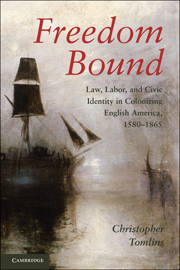Book contents
6 - Unpacking
Received Wisdoms of Law and Work
Published online by Cambridge University Press: 05 June 2012
Summary
From such as would our rights invade
Or would intrude into our trade
Or break the law Queen Betty made
Libera nos Domine
Seventeenth-century English wool combers’ song
More than sixty years after its publication in 1946, Richard B. Morris’s Government and Labor in Early America continues to set the tone for much of the scholarship addressing the legalities of work and labor on the colonized mainland through the end of the eighteenth century. “The world of labor that the Revolutionary generation inhabited,” Robert Steinfeld argues in The Invention of Free Labor, “was a world derived from English labor practices of an earlier era. The English colonists who settled the North American mainland in the seventeenth century brought with them many basic legal features of a labor system that had been in place for centuries.” Characterized by “pervasive … legal intervention in the lives of ordinary laboring people,” it was a system grounded on medieval and early modern statutes – the medieval statutes of labourers and in particular the Tudor Statute of Artificers – “enforced throughout the realm.” Those same statutes served as a template for “American” legal rules that reproduced all the essentials of that English system in the colonies. Steinfeld, in fact, has extended Morris’s writ into territory that Morris himself declined to enter. Where, for example, Morris found embedded in the statutes a purpose not only to guarantee the employer adequate labor at subsistence wages but also “to safeguard the worker against unrestrained exploitation,” Steinfeld finds only the former, an “oppressive regime of legal regulation” that constituted coerced restraint as labor’s normal legal form by criminalizing all forms of contract breach. Individual freedom of movement is Steinfeld’s definitive measure of civic autonomy in Anglo-American legal culture. So measured, he concludes, “free labor” is a definitively modern phenomenon, a creation of the early republic’s proto-capitalist economy.
In this chapter, which continues Part II’s inside narrative of the legalities of colonizing, I examine whether accounts that posit the transplantation of an essentially unitary array of legal regulations to govern the foundational colonizing activities of work and labor must be reconsidered once one takes note of the endemic variation that characterized both conception and execution of the relevant legalities across locality and region. First, I trace the history of English labor statutes prior to the Statute of Artificers; then I consider the formation of that statute and its administration in England. Upon inspection, it becomes apparent that representations of a singular and long-established English labor “system” – rooted in the fourteenth century, epitomized by the Statute of Artificers, uniformly enforced, uniformly oppressive – do not comport with early-modern reality. Variety, not “uniform national rules” and uniform oppression, is the mark of early-modern England’s legal culture of work. Equally important, to define civic “freedom” only as the absence of legislative incursions on individual autonomy is (as Morris himself seemed to realize) stunted. The variability of English regional legal cultures meant that statutory initiatives were implemented in a diversity of jurisdictional contexts. That diversity created opportunities for the collective construction of civic rights, or at least expectations of rights, out of putatively regulatory measures. Neither in England nor, by the same token, in colonial English America, should a purely negative liberty – “individualism” – be assumed a doctrine “glorified” among laborers.
- Type
- Chapter
- Information
- Freedom BoundLaw, Labor, and Civic Identity in Colonizing English America, 1580–1865, pp. 231 - 295Publisher: Cambridge University PressPrint publication year: 2010



